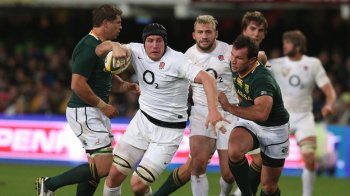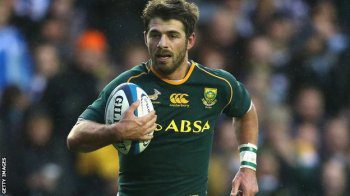
LONDON, ENGLAND – The English media is notorious for overreacting to their sporting successes and failures. The national soccer team is destined to win every World Cup, until they “embarrass the nation” once more. The cricket squad needs drastic, program-reforming overhauls, until they win a Test, in which case all is right in the world. Narratives can shift in the blink of an eye, so it’s not unusual for the English media to overreact to a defeat. All caveats in place, England’s 31-28 loss to South Africa on Saturday was disheartening from a number of standpoints.
The first half was simply dreadful from the home side’s standpoint, riddled with poor penalties and even worse handling. The number of knock-ons was staggering, even allowing for wet conditions on the ground. Handling was much improved after the half, but damage had been done. South Africa entered the break 13-6 ahead, thanks to a Jan Serfontein interception try from an abysmal Danny Care pass. Within a minute of the restart Willie Le Roux produced a sublime piece of skill to send Cobus Reinach into the try zone, and put South Africa ahead 20-6. It appeared that the Springboks might run away with the match.

Matfield’s sin-binning for repeated infringements at the maul gave England a ray of light. In their most encouraging moments, the England forward pack rumbled more than twenty yards from a maul to score a try. They followed up by travelling more than thirty-five from yet another maul to add a second and tie the match at 20. Things settled into an uneasy equilibrium for about ten minutes, but the Springboks weathered the storm and responded through Schalk Burger. The flanker snuck out the side of a maul, dove into the corner, and put South Africa ahead for good in the 53rd minute. Dylan Hartley was sin binned for an idiotic stamp in the 60th minute, and power rested firmly in Springbok hands. Though George Ford cut the England deficit to five with a 67th minute penalty, Pat Lambie responded with a drop goal that put South Africa 8 ahead with under ten minutes to play.
Positives for England included the set piece, which remained impressive. However, their lack of a clinical edge once again came to the fore. Danny Care and Owen Farrell may both find themselves on the bench against Samoa, and faint cries for replacement have risen to howls. This being England, all that could change in an afternoon against Australia. This autumn campaign closely resembles 2010, the previous year prior to a World Cup. England lost to South Africa and New Zealand, but defeated Samoa and Australia decisively. In the wake of the Australia victory, a 35-18 thumping, outlets were happy to report the birth of a “new generation” and that England were World Cup competitors. As 2011 proved, nothing could be further from the truth. That England squad had skill, but the fault lines were clearly present. Here, there is more cause for hope. England are on their fourth and fifth choices in the front row, locks, and centers. Though fitness is never a certainty, it is difficult to see England confronting a situation in 2015 where they are missing Joe Launchbury, Dan Cole, Alex Corbesiero, Manu Tuilangi, Tom Croft, Geoff Parling, Luther Burrell, and Tom Youngs, among others. No squad makes it into a World Cup fully healthy, but England’s current injury crisis borders on the absurd.

Stuart Lancaster has also come in for some hasty criticism in the wake of five successive defeats. If the program were full of internal bickering, as it was under Andy Robinson or Martin Johnson, this criticism might be justified. But Lancaster has succeeded in building a program with real cohesion and depth. England supporters in 2011 could not have imagined the turn-around in 4 years after an absolutely insipid showing in New Zealand. Lancaster’s teams always fight, even though they have been outclassed on more than one occasion. Is this enough in top-tier international rugby? For the moment, and for England, it must be. Judging a World Cup the year before it occurs is the height of foolishness, as people who paid attention in 2010, 2006, and 1999 can tell you. 2003 was the only team that dominated fully the year before their triumph, making that England squad an exception, not the rule. The problem with the English media is that it was their exception, so they hold it to be the gold standard. If Clive Woodward wants to manage so badly, he should find a job somewhere other than Sky Sports.
England’s national team is not perfect. At best, it sits squarely third in the world at the moment, and even that placement is up for evaluation after their upcoming matches against Australia and Ireland. However, the histrionics from across the pond are mere cynical attempts to fill column inches. If England falter badly in the Six Nations, losing two matches, there may be cause for concern. At the moment, they have lost fie relatively close games to the two best teams in the world, despite not playing their best rugby, or with their best players. Everyone could use a moment to calm down, which the match against Samoa should provide.

